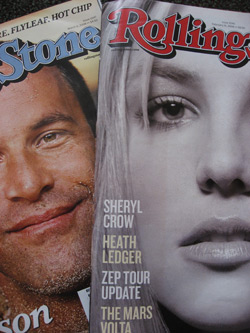 Back in the 1980’s, my brother and I shared a subscription to Rolling Stone magazine. That, and MTV, were our only windows into the world of music from our suburban New Jersey home. Today, kids are inundated with ways to discover bands, read news, buy music, connect with other fans, and even with the band themselves on the web.
Back in the 1980’s, my brother and I shared a subscription to Rolling Stone magazine. That, and MTV, were our only windows into the world of music from our suburban New Jersey home. Today, kids are inundated with ways to discover bands, read news, buy music, connect with other fans, and even with the band themselves on the web.
I recently decided to start subscribing to Rolling Stone after a decade and a half lapse, and received my first issue last week. So much of it hasn’t changed at all, which in many ways was a thrill. Looking at it through my adult eyes, with the web in mind, here are the pros and cons of the print version of Rolling Stone magazine:
The Awesome
- Seeing how little of the magazine format changed, and how well it worked in any era.
- The cover story was on Britney Spears. Even though the web is overflowing with news about her, this article gave a concise, engaging, and deep view into her current situation. On the web, I often just see bits and pieces of the latest news, without “the big picture.” Really well done.
- While I see a ton of photos online each day, I find myself really studying those in print. For all I can complain about how untimely news can be in a print magazine, I certainly spent more time reviewing the few Grammy photos in Rolling Stone, than I did online, than I did the thousands on the web.
- The brand equity of Rolling Stone (and so many print brands) is incredibly apparent. Their is a sense of authority not just in how it approaches its topic, but in how I approach Rolling Stone. That is a level of respect and trust that remains unbroken through a 15+ year absence of the brand in my life. I suppose the real question is, will today’s generation of kids have any knowledge or respect for the Rolling Stone brand.
- I find myself reading about bands that I don’t listen to, and don’t care about. And this is a good thing, because it gives me a broader perspective than my very niche searches on the web. Reading a magazine is often an experience of exploration. Searching on the web is often a narrow hunt for specific information.
- The magazine works hard to establish the royalty of rock, whereas the web always seems focused on the hottest new bands. Perhaps it is just because I am getting older, but sometimes I enjoy reading about bands who have existed for more than six months.
- My wife and I both felt that a one page article on Heath Ledger should have been a much larger feature, including the cover. But perhaps that is simply because the web fails to reflect the gravity of emotions that go into news like this. The piece on him was incredibly good. I suppose print can give greater weight to a topic.
- I have always respected that Rolling Stone gives significant editorial pages to politics. But as a kids and an adult, I have never read those articles.
The Weird
- Seeing a spread of Grammy photos 2 weeks after the event. The Oscars are even past now.
- The feature article on Clive Davis keeps referencing when the author interviews Clive, in the time frames of last summer and last fall. I believe the most recent reference is from five months ago. Note: the story is not posted on their website.
- Seeing listings for top college radio albums and sales from record stores. It just seems to harken back to another era. They list top iTunes tracks as well, but I am more interested in tracking what bands are getting buzz on social media sites like Hype Machine, music blogs, MySpace, etc.
- The reviews at the back of the magazine are an anachronism in today’s world. Amazon has forever changed my expectations of reviews. I love having an “authoritative” review, but need for it to be followed up with reviews and an aggregation of ratings from a variety of voices to truly trust it.
- They do little to admit that the internet exists, even their own website. They have a “downloads” section and the “iTunes Top Ten Tracks,” but are missing a link to the truly amazing features of social media.
All in all, I am enjoying this magazine. But I simply have to wonder if my generation will be the last.
